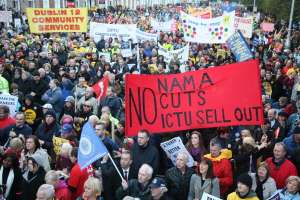|
Blog Feeds
The SakerIndymedia Ireland is a volunteer-run non-commercial open publishing website for local and international news, opinion & analysis, press releases and events. Its main objective is to enable the public to participate in reporting and analysis of the news and other important events and aspects of our daily lives and thereby give a voice to people.
Public InquiryInterested in maladministration. Estd. 2005
Human Rights in IrelandIndymedia Ireland is a volunteer-run non-commercial open publishing website for local and international news, opinion & analysis, press releases and events. Its main objective is to enable the public to participate in reporting and analysis of the news and other important events and aspects of our daily lives and thereby give a voice to people.
Lockdown Skeptics
|
The Business Run Society national |
anti-capitalism |
feature national |
anti-capitalism |
feature
 Saturday July 02, 2011 22:14 Saturday July 02, 2011 22:14 by ArtistKnownasG by ArtistKnownasG
 Reflections on the corporate takeover of society
Crises of capitalism
It has been said that we live in a business run society which is characterised by business parties masquerading as political parties and a 'political class' that implements policies which more often than not puts the interests of 'big business' ahead of the well being of the general populace. The unprecedented nature of bank bailouts in this country along with continued and debatable payments to bondholders with an apparent absence of serious public consultation let alone a referendum on matters with such wide-ranging and generational consequences seems to lend some credence to this characterisation of modern society.
Related Links:
"ill fares the land where wealth accumulates and men decay" ~ Oliver Goldsmith Those who argue society functions in these terms would probably not view 'political contributions' or the appointment of former politicians to the corporate boardrooms across the banking sector for instance as mere coincidence or acts of altruism. While employers groups, lobbyists, and a currently much maligned group, economists, have been depicted as 'cheerleaders' of the prevailing economic orthodoxy, in essence, free market propagandists with concomitant messages of wealth creation and growth who celebrate the great entrepreneurial alchemists and 'exceptional' risk takers while trumpeting, according to themselves, the 'inherent fairness' and 'natural internal equilibrium' of the market system. The 'citizens' in such a society have a role, that of the consumer-citizen and taxpayer. They purchase the range of products that were previously rights under the nascent Irish constitution but which have long since been commodified. These include education, health and housing, the latter in particular is often many times the average industrial wage and leads inevitably to the creation of vast numbers of 'indebted consumer-citizens' (it is generally accepted that the ready availability of credit masked the decline in salaries and rise in cost of living giving the illusion of prosperity). The consumer-citizen pays taxes (direct and indirect) which greatly assists the political class with the day-to-day running of the business society. Within the society as a whole, sports events are saturated with commercial sponsorship and advertising while those wearing the 'team kit' unwittingly become walking billboards. TV programmes are regularly interrupted by advertisements; cinema, radio and internet all follow suit. During 'bank holidays' the consumer-citizen is free to sit in public spaces that are increasingly arenas of brightly lit advertisements for multinational corporations who have amassed more power than nation-states while the 'market' has the power to decide the fate of so called 'rogue democracies' with the push of the 'invisible button'. Within the business run society model, the business message is repeated by 'political CEOs' who have remarkably similar things to say to their beleaguered populations: 'austerity has to be implemented to reassure the markets' and 'there is no other way' (to cite but a few). In the midst of such pronouncements, the revolving door from politics to business to lobby groups often moves faster that the promised political and economic reform. In the business run society, the business or 'hard-nosed/no nonsense' message is backed by stock exchange reports (as if we are all nervously awaiting our annual dividends) along with further abstract indicators such as GDP, the Consumer Price Index, rise or fall of inflation, which tell us next to nothing about the social health of a society nor the quality and happiness in people's lives but instead are principally concerned with the health and well being of money; the life blood of the business run society. In so called recessionary times, the passive, atomised, consumer-citizen is pushed reluctantly to centre stage because whether they like it or not they have to do the 'heavy lifting', 'feel the pain', 'take the medicine' after the 'excesses of the boom' during which 'they all partied' (a 'guilt' message which is rarely challenged by the corporate media). However for a brief moment, one has a sense, amidst the angst around declining wages and unemployment, of the emergence of citizens who are passionate about an economic and political system that operates in the interests of society as a whole and not just the fortunate few. The existence of such people is often reflected in public marches and debate, petitions and endless blogging by the often furious and marginalised. The 'business politician', attune to such anger and resentment is accused, rightly or wrongly, of paying lip service to the consumer-citizen because the electorate has to be placated in the interests of re-election while simultaneously great effort is made to reassure the business community (those formerly known as the 'merchant princes' or 'captains and kings of industry' no less) that the corporation tax rate will stay low, State assistance is still available and despite everything, the country is 'still a great place to do business'. Once the political rhetoric fades, the burden placed on the consumer-citizen is readily apparent: those who are alleged to have sunk the State financially and ruined its international reputation do not face trial, heads of financial institutions walk away with multimillion euro bonuses while quite extraordinarily, banking monopolies or 'duopolies' emerge which further concentrates power and wealth. Conversely, social and health benefits are cut for the blind, the sick and unemployed, salaries reduced while threats of more 'pain' to come are repeated by Ministers on staggering salaries, paid for of course by the consumer-citizen. State media, which generally reflects the elite point of view, focuses on 'green shoots', 'falling unemployment', and 'economic corners turned' (more often into cul de sacs) while the working poor are berated for not being competitive enough while the unemployed are marginalised, excluded even, in the hope they will be forgotten and ultimately disappear from the daily discourse. In the business run society, those who do not fully realise the societal context in which they live, work and consume naturally ask how things can be the way they are? How can politicians be so ‘stupid’ to give a blanket bank guarantee way beyond anything that was required? How can a Prime Minister be earning many times the average industrial income at a time of 'unprecedented national crisis'? How can bailed out banks layoff thousands and increase mortgage interest rates on already hard pressed consumer-citizens? How is it that the great bulk of the unemployed seem to be left largely to their own devices? People rightly ask: Where's my bailout? My stimulus package? But when seen through the prism of the business run society those questions of despair do not come as a surprise, they come to be expected. The consumer-citizen also wonders what the future holds for them and their children. It is not that difficult to broadly predict what is to come using past actions as a guide; policies that benefit business will be implemented along with inadequate socio-economic measures spun as attempts to 'ease the social burden'. Multiple and obsequious visits to Wall Street by political leaders seem to highlight the lessons learnt or not learnt from an economic collapse that was caused in large part by bankers, financiers and their political acolytes as well as the extent to which the concept of a business run society may indeed be an accurate characterisation of the Western socio-economic model. |



















 printable version
printable version

 Digg this
Digg this del.icio.us
del.icio.us Furl
Furl Reddit
Reddit Technorati
Technorati Facebook
Facebook Gab
Gab Twitter
Twitter